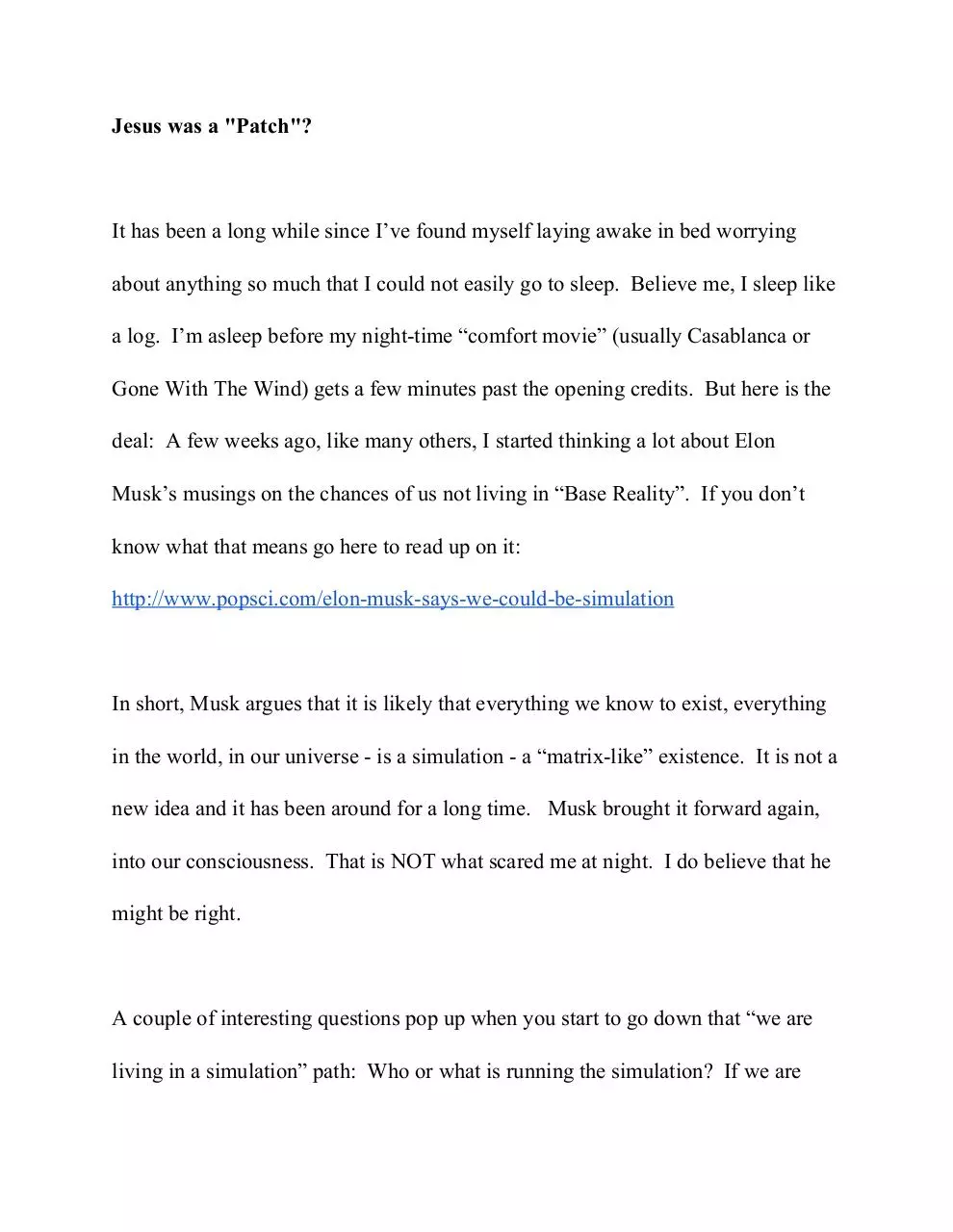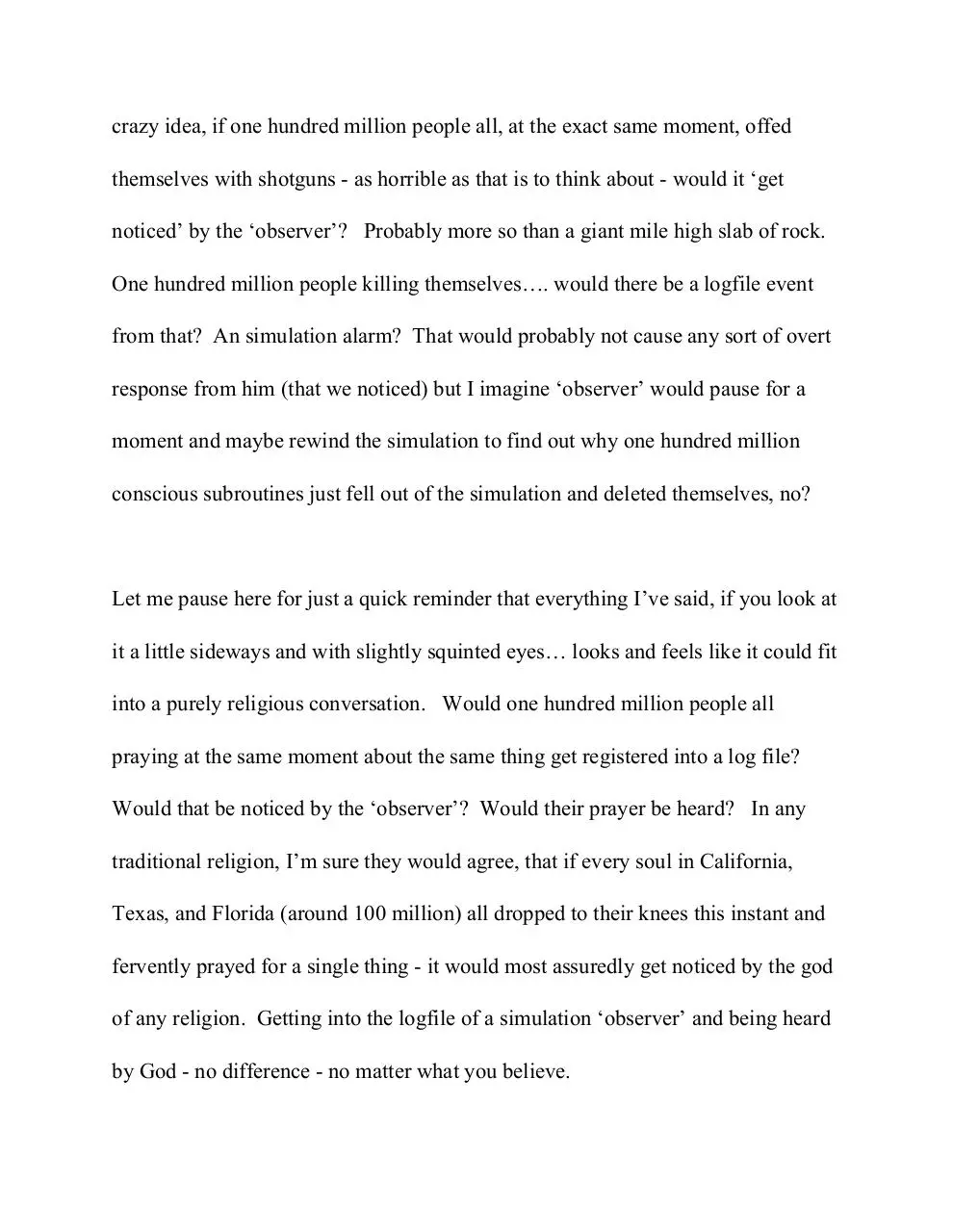Jesus was a Patch (PDF)
File information
This PDF 1.5 document has been generated by / Skia/PDF m55, and has been sent on pdf-archive.com on 03/11/2016 at 22:13, from IP address 209.81.x.x.
The current document download page has been viewed 454 times.
File size: 97.03 KB (12 pages).
Privacy: public file





File preview
Jesus was a "Patch"?
It has been a long while since I’ve found myself laying awake in bed worrying
about anything so much that I could not easily go to sleep. Believe me, I sleep like
a log. I’m asleep before my night-time “comfort movie” (usually Casablanca or
Gone With The Wind) gets a few minutes past the opening credits. But here is the
deal: A few weeks ago, like many others, I started thinking a lot about Elon
Musk’s musings on the chances of us not living in “Base Reality”. If you don’t
know what that means go here to read up on it:
http://www.popsci.com/elon-musk-says-we-could-be-simulation
In short, Musk argues that it is likely that everything we know to exist, everything
in the world, in our universe - is a simulation - a “matrix-like” existence. It is not a
new idea and it has been around for a long time. Musk brought it forward again,
into our consciousness. That is NOT what scared me at night. I do believe that he
might be right.
A couple of interesting questions pop up when you start to go down that “we are
living in a simulation” path: Who or what is running the simulation? If we are
playing with “house money” and this is all just a simulation, does anything we do
matter? What is the point of the simulation? Entertainment? Scientific? Is there
any way that we can test or prove we are in a simulation? Aside from all of those
questions - the whole of it leads me to the realization that the difference between a
strict religious philosophy and a firm belief that we are living in a “non-base
reality” simulation is… zero.
Let’s assume for the fun of discussion that we are in a “matrix” or simulation. We
have no idea who or what is running the simulation. But let’s say that they are
observing it and that we humans are somehow an interesting part of the simulation.
Somehow, for pleasure, for some experimental reason, or for whatever reason, all
the living things in the simulation that have consciousness (mostly all living things)
are worth observing, as a whole. Now let’s imagine that the ‘observer’ is really
really intelligent - but not infinitely so. Maybe they or, their brains, are a half
order of magnitude more computationally able than ours, but they are not
“god-like” or “infinite”, and they do not have unlimited ability. They are probably
running our simulated universe on some sort of computing device. But even if
they are many orders of magnitude more computationally able than us or our
computers, and even if they are able to run our current reality as a subdivided
virtual machine inside their own ‘mind’ - it is not impossible to think that they
would have some limitations as to what they could observe at any moment, they
are not omnipotent. However, they would be able to, in real time, know and
observe any particular element inside the simulation to whatever degree they
pleased. As I am sitting here typing, they could be 100% aware of every aspect of
my whole being at this moment. Every thought, molecule, atom, etc. Much like a
software developer in our reality could easily focus in on a subroutine as they
troubleshot a whole web application or database. And furthermore, whoever is
running our current ‘matrix’ could likely have extremely full knowledge of larger
scopes in the simulation for example, depending the ‘observer’s’ brain power, they
could probably have a very high observational knowledge of a small city - what
every person is doing, thinking, the placement of every object in that area, all of
the physical conditions, etc. But just like a software developer who could not have
perfect knowledge of every variable, and detail and logical counter in a very large
bit of software, like for instance an OS, the ‘observer’, however powerful, would
have limitations.
It is doubtful that the ‘observer’ would sit watching our universe like it was a TV
show. It would be a noisy, damn boring one. With all that noise, it begs the
question: where are the log files? What gets recorded in them? Much of the
simulation would be just noise - the actions and thoughts of six billion people and a
trillion animals is a lot of noise - there would likely be ‘interesting’ events and
‘non-interesting’ ones. The interesting events would need to stand out somehow.
They might be logged and noted by the ‘observer’. Alarms and logs would save
the ‘observer’ from having to pay an incredible amount of attention to the
simulation. He could just check out the log files. “What’s going on in my
simulation today?!” they might ask… “oh, Here we are” Looking at the logs and
alerts: “Wow - looks like some geophysical events just wiped out 500K ‘simulants’
(people) - but it appears as though the rest of the simulation is stable, so all is well.
I can go back to eating Cheetos.”
How many humans doing a single focused act do you think would it take to trigger
an ‘interesting’ logged event? I read something they other day, some guy was
arguing that there were ways of testing if we were in a base reality or not and that
most ways were rubbish. He suggested we should maybe build an enormous
monolith, unimaginably big, to get any ‘observer’s’ attention. I think his idea was:
in order to get on the ‘observer’s’ radar and possibly provoke a reaction, we
needed to do something very noticeable. (get logged) Here is a ridiculous and
crazy idea, if one hundred million people all, at the exact same moment, offed
themselves with shotguns - as horrible as that is to think about - would it ‘get
noticed’ by the ‘observer’? Probably more so than a giant mile high slab of rock.
One hundred million people killing themselves…. would there be a logfile event
from that? An simulation alarm? That would probably not cause any sort of overt
response from him (that we noticed) but I imagine ‘observer’ would pause for a
moment and maybe rewind the simulation to find out why one hundred million
conscious subroutines just fell out of the simulation and deleted themselves, no?
Let me pause here for just a quick reminder that everything I’ve said, if you look at
it a little sideways and with slightly squinted eyes… looks and feels like it could fit
into a purely religious conversation. Would one hundred million people all
praying at the same moment about the same thing get registered into a log file?
Would that be noticed by the ‘observer’? Would their prayer be heard? In any
traditional religion, I’m sure they would agree, that if every soul in California,
Texas, and Florida (around 100 million) all dropped to their knees this instant and
fervently prayed for a single thing - it would most assuredly get noticed by the god
of any religion. Getting into the logfile of a simulation ‘observer’ and being heard
by God - no difference - no matter what you believe.
If we humans are a simulation that, have up until recently, naturally evolved
religions in purely organic ways… if we, for tens of thousands of years have
lacked the neural mass… if the metaphorical layer of understanding that was one
more layer of neocortex above what we have ever had, is where “God” was born
and lived - then it is interesting that we now, very recently, have finally advanced
our understanding and technologies so much that we are building a layer of neural
understanding over the top of our own God’s grave (after all, we are turning away
from him in droves) only to discover that He moved one floor up and is now the
“observer”. We got more brains - he got more real. What is the old saying?
“What comes around goes around.”
But that is still not what made we lay awake in bed, scared.
It is also interesting that the ‘observer’ of our simulated universe has never directly
revealed himself. Not that we are aware of anyhow. It appears as though our little
‘matrix’ simulation - once set in motion has run its course from big-bang to the
present without any heavy handed tweaking of the simulation by the ‘observer’.
Maybe our simulation is the equivalent of a high school science project. Maybe
the ‘observer’s’ teacher handed out an assignment: “Starting with the
computational framework provided, edit the spacetime fabric such that the
cosmological constant, the boson vacuum level, the speed of light, and the
gravitational constant are balanced so that the simulation evolves and results in
conscious beings creating their own universe simulations.” And right now some
Harry-Potter-like student is ‘observing’ our simulation hoping that conscious
beings on some planet (maybe us!) in his universe creates their own simulation so
that he can get an “A” and graduate. Or maybe our ‘observer’ is Draco Malfoy!
Yeiks! More on that later.
But what if an ‘observer’ was allowed or able to, for any reason, gently direct the
simulation. If they didn’t want to let on to the “conscious subroutines” (us people)
in his little simulation that he existed - then the direction he could provide would
have to appear natural and nearly invisible. To save simulation compute time,
could they “Patch” the simulation in min-operation? Software developers in our
reality apply patches to their software all the time. Would it be possible to
introduce small directed patch elements into the universe simulation that would
alter the “simulation reality trajectory”? It is fun to imagine that an astute
simulation ‘observer’ might be able to predict that if they didn't introduce a few
patch alterations to the ‘code’ that the simulation might not make it to its
successful completion? There might be hundreds of thousands of planets with
civilizations on them in a simulated universe, maybe the ‘observer’ would very
much want them to evolve successfully to the point where we are now, and perhaps
beyond. Are there ideal conditions or ideal beliefs that need to be introduced at
certain times in order for a struggling civilization to get to an ‘Information Age’?
Imagine for a moment that Jesus Christ was a “Patch”. It’s all just “fun and
thought-games” I suppose, but that New Testament religious meme might have fit
pretty perfectly into directing a simulation to ends that were useful to the
‘observer’. (whatever ‘useful’ is in their context.) “For the Observer so Loved the
Simulation that He sent his Only Begotten Patch that Whoever Believeth in It shall
have Eternal Runtime”?
By the way - That also did not keep me up at night.
But if we are not in base reality, if we are “simulants” and our scientists looking
for fundamental laws of nature - chopping away with axes at code we can’t fully
see - what can we hope to find? Should we interpret our findings differently if we
believe that when we blast electrons at each other in the Large Hadron Collider
(LHC), we are really blasting clumps of binary data around, hoping that exposes
the subroutines that guide the data? The results of LHC experiments, are they
small memory dumps - SEGFAULTS - filled with simulation noise? Are we
looking for electromagnetic patterns in the noise when we should really be having
cryptologists and linguists look for code fragments? Are quantum mechanical
black holes and big black holes just large blocks of “zeros” - or protected memory?
This is the most exciting and fertile ground I think. Where the answers to
questions that we seek may actually intersect with what the ‘observer’ might also
be seeking. If the simulation is perfect enough, if the programing is right, could
there be fundamental properties from ALL realities, ours and the ‘observer’s’,
which we have been set to work finding on his behalf? Or it is possible that the
‘observer’ has no interest in the fundamental laws of the universes - and it is just
coincidence that any simulants that have built neural complexity and world
technologies enough to become themselves ‘observers’ and creators of their own
simulated worlds - would also, at the same time, be on the cusp of understanding
the “Grand Unified Theory” (GUT) dictated by the very simulation algorithm they
inhabit. Are both of those evolutionary paths converging in our simulation?
Understanding “universe reality” through physics research and “universe
simulation” through computational progress - at nearly the same time would be the
Download Jesus was a Patch
Jesus was a Patch.pdf (PDF, 97.03 KB)
Download PDF
Share this file on social networks
Link to this page
Permanent link
Use the permanent link to the download page to share your document on Facebook, Twitter, LinkedIn, or directly with a contact by e-Mail, Messenger, Whatsapp, Line..
Short link
Use the short link to share your document on Twitter or by text message (SMS)
HTML Code
Copy the following HTML code to share your document on a Website or Blog
QR Code to this page

This file has been shared publicly by a user of PDF Archive.
Document ID: 0000503154.